Chris Baty's Blog, page 192
March 26, 2014
Everything We Know About...Nonfiction!
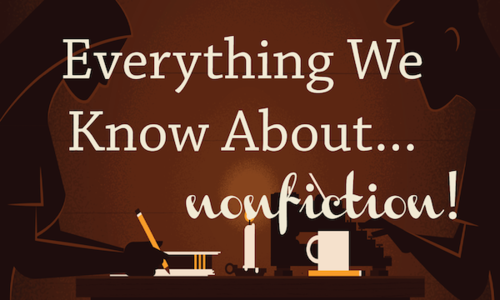
Are you tackling a writing project that isn’t a brand-spanking new novel during Camp NaNoWriMo? Good news! We’re compiling lists of everything we know about nonfiction, editing, and scripts. Check out our first below:
We, at Camp NaNoWriMo, have not forgotten about nonfiction! Don’t be intimidated by the word “nonfiction.” It’s a big, beautiful category, sure, but we have these wonderful resources to ease your anxieties about starting and writing it:
What is Creative Nonfiction?
What is Creative Non-Fiction?
Different Ways to Tell the Truth: A Primer on Creative Nonfiction Subgenres
Tips for Nonfiction
Conquering Creative Non-Fiction
You Should Write Nonfiction Because…
Why I’m Writing Memoir: Memoir is French for Awesome
Why I’m Writing Creative Nonfiction: Delving Inside People’s Heads
Keep These In Mind When Writing Nonfiction
Six Guidelines for Writing Creative Non-Fiction
Top 10 Things All Memoir Writers Need To Pay Attention To
5 Ways To Start Your Memoir On the Right Foot
Nine Things You Need to Know Before You Write Your Non-Fiction Book
Anybody writing creative nonfiction for Camp NaNo?
Bring a Friend to Camp Day!

Camp NaNoWriMo is less than a week away, which means it’s time for our official Bring a Friend to Camp Day! Camp lets you tackle any writing project, and set your own word-count goal, which means it’s perfect for the budding writers in your life who may be intimidated by 50K.
If you reblog or like this post, you may even win two Camp NaNoWriMo Care Packages, just to make sure you and your friend both feel thoroughly welcomed to our cozy virtual writing retreat.
At the end of the day, you could bring a friend to Camp, rock some writerly goodies, and get an extra boost as you get ready for your writing project this April. That’s what we call a win, win, win.
March 25, 2014
HQ Introductions: Greetings from NaNoLand!

Dearest Wrimos,
About 5½ years ago, I spotted a friend of mine sitting in a corner of our high school classroom, furiously typing away at the computer and occasionally glancing at the clock in trepidation. Considering that our biggest achievement in this class so far had been pretending to study Latin by looking up the roots of Harry Potter spell incantations (senioritis had definitely struck by then), I curiously asked her what she was working on. “I’m writing a novel,” she told me tersely, “and I need to write 500 more words by the end of the day or I won’t make it!”
This was my introduction to NaNoWriMo, and I was both intrigued and terrified by the prospect of writing so much, so quickly. While my inner Perfectionist voice gibbered away at me with “What if?”s and “That’s impossible!”s, I was slowly circling around the NaNoVerse while it pulled me in ever closer, like a sneaky whirlpool of awesomeness. First, I created an account to look around the NaNo website. Then I started uploading blurbs of my unfinished novel. Before I knew it, I had packed up my car to roadtrip across the country; and now, six months later, I find myself sitting in front of a computer in the NaNoWriMo headquarters in Berkeley, delirious with happiness–or maybe it’s caffeine.
So, all right, the possibility of interning here wasn’t the only factor in my moving to California, but I’m glad this is where I’ve ended up. I spent the last four years obtaining a BA degree in English at Vassar College in Poughkeepsie, NY, as well as a minor in Medieval and Renaissance history when I realized that most of the English classes I loved involved books written before the invention of modern-day paper.
When not frantically writing to meet a midnight deadline, you may see me around the Bay Area, dancing all the time and in any way possible: ballet, modern, dance fitness, swing dancing, dancing in the rain–oh, wait, that one’s a movie, but I’d still like to try it. I also love creating surrealist paintings and sewing outlandish costumes. Other life interests include large fluffy dogs and making up silly songs by a bonfire.
I’m super excited be so closely involved in this community as we roll on to Camp NaNoWriMo!
– Katharine
HQ Introductions: Wendy at Camp NaNoWriMo
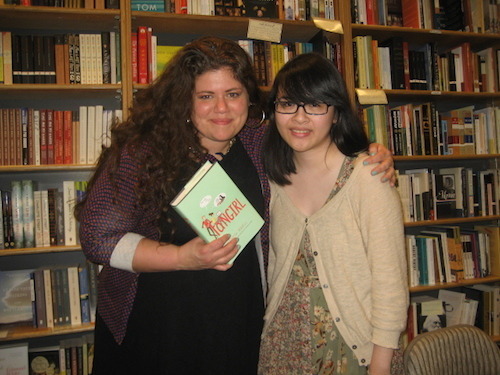
Hello Campers and Wrimos!
I am Wendy, lover of books, fonts, and space. (Bonus points if all three things are combined together with a floating animal.) I am also one of the new interns who will be helping out with Camp NaNoWriMo.
Important things you should know about me:
I am a native of the Bay Area and a graduate of Mills College with a degree in Creative Writing.
I am a huge lover of Young Adult novels. Young Adult is the only genre my eyeballs and brain will allow me to read. (I’m still burnt-out on Classics because I had to read a lot of them for my English courses.) If you need recommendations, I am your gal Wendy.
I had known about NaNoWriMo for years, but was too scared to participate until 2012, during which I sadly did not win. *cue sad instrumentals* Never fear though! I managed to conquer the novel in the end with the help of a writing support group cheer-leading me whenever I spiraled into a pit of despair, Firefly (which I re-watched countless times throughout the month of November) for research purposes, and pictures of the galaxy.
I have never camped in my life. Both in the woods and with the NaNoWriMo version. (If I write about camping for my Camp NaNoWriMo project, that counts as actual camping, right? No? Okay.)
I’m excited to be interning here and working with the awesome staff. I’m not sure how else to convey my excitement, except to flail my arms erratically and emit a weird dinosaur noise from my back of my throat. That’s me, overcome with emotions.
That should be it. I don’t want to say too much. Gotta keep a level of intrigue.
— Wendy
March 21, 2014
Camp NaNoWriMo Welcomes Back "Ask An Author!"
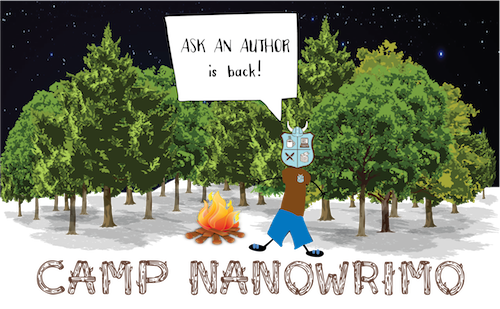
Camp NaNoWriMo is back with our Ask An Author series! We have resurrected it from hiatus, so perch yourselves on logs around the campfire, grab some marshmallows, and listen up! You’ll want to.
We have four authors who will be acting as honorary Camp Counselors, answering any questions you have about writing, editing, publishing, or planning.
All you need to do is ask your questions through our Ask NaNoWriMo box, or on our Facebook page.
We welcome our honorary Camp Counselors:
Andrea Hannah, author of upcoming YA novel Of Scars and Stardust.
Marivi Soliven, author of The Mango Bride.
Patricia Wrede, author of fantasy novels such as the The Enchanted Forest Chronicles.
Michael David Lukas, author of historical novel The Oracle of Stamboul.
What questions do you have for our first author, Andrea Hannah? Perhaps something about how to create three-dimensional characters or why Young Adult novel is a great genre to write? Anything! Just get those questions in.
March 19, 2014
Completing Your Writing Toolkit with Aeon Timeline
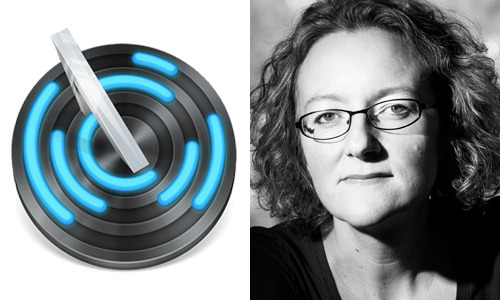
Are you getting ready for Camp NaNoWriMo? Every year, our amazing sponsors offer all kinds of prep tools as you pack for Camp. This year, Elizabeth Haynes, bestselling author and NaNoWriMo participant, shares how sponsor Aeon Timeline completes her writing toolkit (Want to try Aeon Timeline yourself? Get 20% off using the code CAMPWRITER):
Let me begin by sharing with you some sample conversations with Linda, Genius Copy Editor who worked on my first three novels.
Linda: “I’m working on the assumption that you did use a tide table to work out when the boat’s floating, and when it’s resting on the mud, right?”
Me: “Um…”
Linda: “Do you realise he gave her the flowers on Saturday 12th, and now it’s Friday 9th and she’s saying the flowers smell lovely but actually it’s 27 days later?”
Me: “Oh, right…oops…”
Linda: “You said on page 24 that he visits her on Fridays, but this can’t be a Friday because yesterday he went to the evening class, and on page 122 you said that he goes to evening class on a Tuesday.”
Me: “Okay…”
I love writing. I love not knowing what’s going to happen, and letting my characters have free reign to find out things for themselves. First drafts for me—and this means November—are not without stress, but generally thrilling. Editing, on the other hand, is shudderingly awful. This is because, whilst writing with joyous abandon, I open up great plot chasms, tie characters in impossible knots, and instead of stopping to untangle them and build bridges, I trot onwards because one thing I don’t do in November is edit.
At some point I have to go back and peer into the chasms and gaze in horror at all those impossible knots, and wonder how on earth I can resolve things. And, partly because they are written so freely, my plots are notoriously complicated, with multiple narrators, often more than one timeline running side by side, and additional material like documents, maps and charts.
And that’s why, when I first worked my way through the Aeon Timeline tutorial, I felt a real fist-punch, jump-up-and-down-and-hug-the-dog moment. Let me explain why. If NaNoWriMo is the SuperTurboBoost engine that gets me writing, and Scrivener is the virtual organiser briefcase full of documents, then Aeon Timeline is having Linda the Genius sitting with me as I write, holding my hand (let’s stop that analogy right there because I can’t type and hold hands with Linda at the same time, but you get the picture).
By entering events on the timeline as I write my draft, I can see the plot chasms and fix them. I can see the timeline conflicts—that this must be a Tuesday, for example—and make sure everything else lines up accordingly. I can prevent characters being in two places at the same time. I can see that if my character is fifteen in 2003, then she must have started secondary school in September 1999, when her sister was nine (ashamed to say that, previously, I would have guessed).
Most importantly—I can let the story unfold in a linear fashion, for each character—and then I can rearrange the narrative to reveal the story in a more interesting way, confident that the timings don’t conflict.
Scrivener has helped me organise the structure of my novels a great deal, so I can find key scenes, isolate certain narratives, move things around—but even Scrivener can’t solve the problem of how to keep track of everything that’s going on. More importantly, Scrivener doesn’t help when I can’t even see the plot chasms that I’ve accidentally opened up.
By using Aeon Timeline early, when I’m writing my first draft and planning how the plot’s going to unfold, I save so much time (not to mention my sanity) later on, when it comes to correcting things. I’ve always looked forward to the copy-edit stage but only because it’s nearly the end of the process. This time I’m looking forward to Linda the Genius getting her hands on my manuscript and not having to weep tears of frustration at the chasms and the knots…
Elizabeth Haynes is a writer living in Kent, in the South East of England. She started writing fiction in 2006 with the annual challenge of National Novel Writing Month (NaNoWriMo) and the encouragement of the creative writing courses at West Dean College. Her novels include Into the Darkest Corner , Human Remains , and Under a Silent Moon .
March 17, 2014
Camp NaNoWriMo 2014: Choose Your Own Adventure

The biggest advantage of Camp NaNoWriMo's grounds being virtual and fueled by imagination? They can be anything we want them to be—with verdant hills so verdant, a crystalline lake so crystalline, and that pod of plesiosaurs lounging on the shore.
Everything about Camp NaNoWriMo is an exercise in choosing your own writing adventure. But is Camp right for you? Let’s find out…
————————————————
1. Writing is cool. If you agree with this statement, skip to #2. If you disagree, skip to #3.
————————————————
2. Correct, writing is cool. Thinking writing is cool is cool. By this logic, you are cool.
Congratulations on your coolness. Follow-up question: Do you consider yourself a writer? If yes, skip to #4. If not, skip to #5.
————————————————
3. Please write us a 150-word explanation of why writing is not for you. (See what we did there?) We are reluctantly interested in understanding your bizarre ways. Once complete, please see #6.
————————————————
4. Awesome! Please excuse as we slip these sunglasses on: your coolness is, like a sunlit glacier, dazzling.
Now, do you have a writing project in mind that you’d like to tackle? If yes, skip to #7. If not, skip to #8.
————————————————
5. But wouldn’t it be cool to write something? Possibly that one idea you had after watching that truly terrible movie about the moon-based robots? You know, the idea that would have made that story actually palatable, and exciting, and character-driven?
If you just remembered that script/novel/memoir idea that’s been lingering in the back of your mind, skip to #7. If you’re still sure you’re not a writer, go back to #3.
————————————————
6. Be honest, you had fun writing that manifesto against writing. The ideas were flowing, you got to use words like “dilettante,” “tepid,” and “cockamamie”. You put your point of view down on paper, and got a little rush knowing that someone would read it.
Admit it: you’re a writer, and writing is cool. (Go back to #4.)
No? You’re sticking to your writing-hating guns? Sigh. Skip to #9.
————————————————
7. Perfect! We’ve been waiting for you! (Not in a creepy way, we promise.) More in the way your dog waits by the door when you’re at work. You know, endearingly desperate for your company.
Camp NaNoWriMo’s word-count tracker, virtual cabins, and writing resources are ready to help you reach any creative summit. Adjust your word-count goal, declare your project (thesis, script, pop-up book: it’s all gold), and please do not feed the plesiosaurs any dairy. They’re going vegan.
————————————————
8. That’s tough! A writer without a project is like me without a smartphone. Directionless, irritable, and overwhelmed with a feeling of missing out on entire worlds of stimulation. Unlike my problematic smartphone addiction though, a writer’s lack of project can be easily cured!
Check out the forums, dust off an unrevised draft, or challenge yourself to try a brand-new genre or style. And honestly, the best way to find inspiration is often just to make the commitment to write in the first place.
Once you’re ready to commit, go back to #7.
————————————————
9. It takes all kinds, we guess. We certainly will not spend the month writing a short story in which a thinly disguised version of you meets their muse-come-to-life, falls madly in love, and writes desperately to make up for their neglectful ways. How weird would that be.
————————————————
10. Why are you on this number? This is totally against the rules,
— Tim
March 14, 2014
3 Ways to Let Your Writing Fly

Camp NaNoWriMo 2014 has officially launched! Whether you’re writing a new novel, tackling a screenplay, or finishing an existing piece of work, Camp is a writing free-for-all. For those of you still on your publishing journey, editor Holly Brady shares why it’s crucial to let go of your writing… and start something new:
When I was a young writer, I was given a piece of advice that has proved to be quite true: what separates professional writers from amateurs is that professional writers know how to let go of their writing.
What does it mean to let go of your writing?
Of course, you want to revise your first draft. You want to deepen your characters, sharpen motivation, fix the plot, and polish the imagery. But there comes a time when you also must give up the control you’ve tried so hard to maintain through the writing process. You must loosen your grip. Specifically, you need to:
Make those cuts
It’s tough to cut out entire paragraphs, sections, characters, subplots when you’ve spent weeks laboring over these things. But I’ve never seen a manuscript that doesn’t benefit from a focused round of cutting.
How do you know what to cut? Look first at the stuff you’re trying to fix. Before you spend several days rethinking that scene, or rewriting that page of dialog, or reworking that subplot, try cutting it entirely. Often, you’ll find that the story gets tighter, and your burden becomes lighter because all you are doing is cleaning up evidence of the cuts; you’re not trying to fix anything anymore. Have courage. Let it go.
Trust your editor
Regardless of whether you’re working with a traditional publisher or self-publishing, you need to work with a professional editor at some point if you hope to compete in an overstuffed market.
Trust your editor. Let him or her help shape your work. After living with a manuscript day and night for months, it’s almost impossible for you to differentiate the stuff on the page from the stuff still swirling in your head. A good developmental editor can show you where you need to patch and fill. And in the process, he or she can add a professional polish to your writing.
But how do you find an editor to trust? This is a particularly personal decision. Some writers prefer “hands-off” editors who suggest broad changes and expect you to make those changes yourself. Others prefer editors who scrub the manuscript—making word, sentence and paragraph changes, and adding suggestions for plot changes as they go.
When you’re deciding on an editor, you have every right to ask for a sample edit of several pages of your manuscript (at no charge). Do you like what they’ve done? Do you agree with what they’ve suggested you do? Have they kept your voice, but made your writing crisper, smarter, more dramatic? If yes, then hire them. If you’re not sure, keep looking.
Let this one fly, and get started on the next
As soon as you sense that this manuscript is ready to go, as soon as you feel the lift, start your next project. There’s no better way to get your first book noticed than to publish a second.

Holly Brady is past Director of Stanford Publishing Courses. She now works as a developmental editor and publishing strategist with writers who are interested in using new media tools to self-publish their work.
Top photo by Flickr user Ars Electronica.
March 12, 2014
The Author/Agent Conversations: On that Elusive Chemistry with an Agent
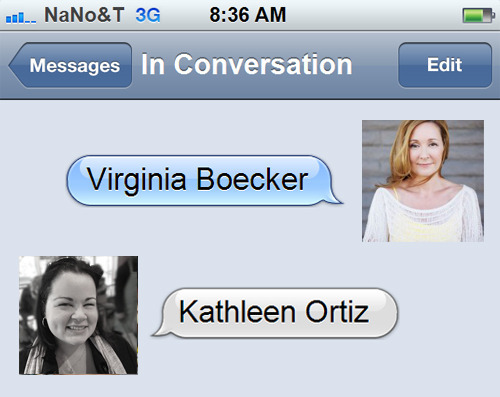
Camp NaNoWriMo 2014 has officially launched! Whether you’re writing a new novel, tackling a screenplay, or finishing an existing piece of work, Camp is a writing free-for-all. For those of you still on your publishing journey, author Virginia Boecker and literary agent Kathleen Ortiz show us what to look for in a great author-agent relationship:
Virginia Boecker (Author, The Witch Hunter): I began writing my novel a couple of years ago, and it began as dare to myself: “Could I write a novel—and finish it?” Turns out I could. But to get that “finished” novel to a point where it was ready to query an agent meant revision—and lots of it. Two more drafts (the first one starting from scratch), notes from beta readers, and many more months editing, to be exact.
Two years later, once my readers said to me: “I don’t think there’s anything else we can help you with,” I knew it was time to go.
Eight weeks, 17 queries, and 10 bitten fingernails later, I signed with my fantastic agent, Kathleen Ortiz, and here’s the story of how that happened.
Kathleen Ortiz (Agent at New Leaf Literary): I was teaching a Writers Digest webinar on how to query agents and Virginia was one of the participants.
Virginia: I had just started querying, and part of my process was to learn as much as I could about agents before querying them. Kathleen was top of my list: she seemed lovely, smart, editorial… and I also liked the fact that she was the Director of Subsidiary Rights. So when I saw she was doing a webinar, I jumped.
Kathleen: All participants got a query critique and when I read her query, I was legit stunned. It was flawless. And my immediate reaction was “I. Must. Read. This.” So I requested the full manuscript, fell in love, emailed her and everything clicked into place after that!
I don’t think authors realize that sometimes agents get nervous, too. Think about it: you know the statistics on how often an agent signs someone. So you know when we offer rep it’s because we really want it. So I read The Witch Hunter pretty quickly: within a week. I emailed Virginia to see if we could set up a call and luckily she didn’t make me wait—we set up a call for the next day.
I remember she seemed so down to earth and easy to talk to (she still is!). I discussed my love of the manuscript, and my thoughts on how we could work together to get it to the next level. Luckily Virginia’s vision was exactly what I had in mind. And she didn’t make me wait too long to find out if she was accepting my offer. I emailed all my colleagues—everyone was working from home because of the hurricane but I’m pretty sure you could hear collective cheers across Manhattan.
Virginia: I was so nervous. But Kathleen was so nice and if she was nervous, I couldn’t tell. She told me what she liked about my book and her ideas for making revisions. I loved all her suggestions and was thrilled when she offered representation.
I wanted to accept right then and there, but I had the full manuscripts out with several other agents and I wanted to be professional and close that loop. That said, I was afraid if I hung up the phone without saying ‘yes’, she would come to her senses and change her mind.
But I called her back on Monday and accepted her offer. And then I drank champagne! (Truth.)
We re-did the beginning: I began with a prologue-ish scene that happened 18 months prior to present day. We also changed the ending.
What’s great about the changes we made prior to sub is that during the editorial process with Pam Gruber, my now-editor at Little, Brown, we didn’t touch the new areas. Pam loved them, I loved them, and Kathleen saw from the beginning how they could be made better and was patient enough to work with me over a period of months to get them there. Smart, editorial agents are the best.
Kathleen: Virginia puts up with my jokes and random emails and is just a really awesome person to work with. She asks all the right questions, is consistently wanting to improve her craft and is zero drama. Seriously a complete joy to work with (I say this in a non-high-school-teacher-report-card-way, I swear).
Virginia: I feel so lucky. Signing with an agent is a strange thing—it’s based on one phone call and a bunch of internet stalking. But I feel like I hit the jackpot with Kathleen. She is always available to answer my questions, always patient, and above all, understands what’s it’s like to be new at all of this.This is especially important during submission when tensions are high. I repeat, tensions are high.

Virginia Boecker lives with her husband and two small children in the Bay Area, CA and is a full-time writer. In her spare time she likes to run, read, and globe-hop wherever and whenever possible. Her debut, The Witch Hunter, a YA historical fantasy, is out from Little, Brown in Spring 2015.

Kathleen Ortiz is the Director of Subsidiary rights, overseeing audio, translation and digital rights, and a Literary Agent for New Leaf Literary & Media. She is always looking for new, talented animator/illustrators and/or authors. Clients include The Simpsons character artist Liz Climo, Nickelodeon animator Sarah Marino, Amazon bestselling author Sarah Fine, and the wonderfully talented Virginia Boecker.
March 10, 2014
#NaNoNewLeaf 2014: Publishing Advice from New Leaf Literary (with tweets) · NaNoWriMo
On February 25, during the “Now What?” Months, we asked the incredible literary agents and assistants at New Leaf Literary to share their advice and expertise with writers around the world. They tackle everything from query letters, to word counts, to international rights.
Chris Baty's Blog
- Chris Baty's profile
- 63 followers



